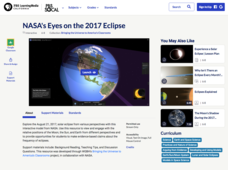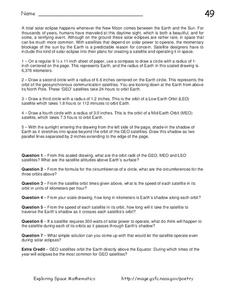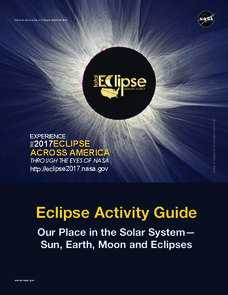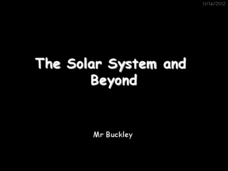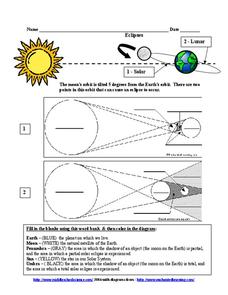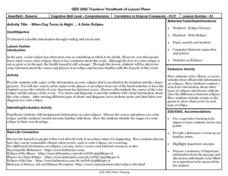PBS
Experience a Solar Eclipse
Didn't catch the last solar eclipse? Now every day can be eclipse day, thanks to an interactive lesson from PBS' Space series for middle schoolers! The well-rounded multi-media experience includes video clips, an interactive, and...
Astronomical Society of the Pacific
Getting Ready for the All American Eclipse!
Give your pupils a front row seat at the biggest light show in the sky this year! In addition to admiring the total solar eclipse, young astronomers can explain the phenomenon with a little help from an inquiry-based instructional...
Big Kid Science
Create Dynamic Art Using the Eclipse!
What happens to light as it passes through a hole? This is the main question centered around the designing of a solar eclipse dynamic art piece that uses a solar eclipse and paper to create a pinhole projection of the art.
PBS
NASA's Eyes on the 2017 Eclipse
How did the 2017 eclipse look in Los Angeles—or Chicago? Experience both views, plus many more, using a lesson from PBS's Space series for middle schoolers. Scholars follow the movements of the sun, moon, and Earth during the most recent...
Space Science Institute
The "All American" Eclipse Guide
Are you ready for the biggest astronomical event of the year? More importantly ... are you ready to share it with your scholars? Use a presentation filled with facts and diagrams to make sure everyone in class understands the importance...
Curated OER
Solar Eclipse
For this solar eclipse worksheet, students solve seven problems about solar eclipses after making a model following five steps. They determine the different orbits for satellites, they determine the lengths of Earth's shadow and...
Illustrative Mathematics
Solar Eclipse
Learners take on the role of astronomers, calculating conditions necessary for a total solar eclipse. Concepts of similar triangles and properties of circles come together as pupils create ratios and use real measurements in determining...
PBS
Why Isn't There an Eclipse Every Month?
Searching for an eclipse activity that sends scholars over the moon? Try an interesting interactive to get their minds active! The resource, part of an extensive Space series from PBS Learning Media, uses modeling and data analysis to...
Columbus City Schools
Experiencing Eclipses
Don't be caught in the dark! Young scientists investigate the causes of both solar and lunar eclipses using an interactive to help them understand the development of an eclipse over time. They then research facts and characteristics...
Big Kid Science
Photographing the Eclipse Tips and Tricks Guide
Use a guide that provides safe ways for viewing the eclipse with a camera or telescope. The guide also includes tips and tricks for getting the best shot using a camera phone or SLR camera. You won't wanna miss this!
Big Kid Science
Create a Milk Carton Camera to Observe the Eclipse!
Step aside, fancy glasses... it's time to create a solar eclipse viewing camera of your own using nothing more than a milk carton.
Curated OER
Student Exploration: Eclipse
In this earthquake exploration worksheet, students complete 3 prior knowledge questions, then use "Eclipse Gizmo" to conduct several activities, completing short answer questions when finished.
Curated OER
The Sun, Moon, and Our Solar System: Teacher/Student Notes
Introduce basic Earth and space science to your budding astronauts. This handout works in two ways, the first part provides information about the sun, moon, eclipses, and Earth to be read to or by the class. The second part is composed...
NASA
Measuring Solar Energy During an Eclipse
Don't leave your classes in the dark! An inquiry-based lesson has young researchers analyze the light intensity before, during, and after a solar eclipse. They use their data to make inferences about the solar energy available during...
Big Kid Science
Eclipse Classroom Activities: Cultural Significance Project
What better way to celebrate eclipses than across cultures? Explore myths of solar and lunar eclipses from ancient cultures like the Chinese, Ancient Greek, Mesoamerican, Incan, Egyptian, Ancient Babylonian, and Middle Eastern. Learners...
NASA
Eclipse Activity Guide
Ever made solar s'mores? Or recreated the solar system using peanuts? Astronomers young and old investigate all things solar using a variety of activities. Explore how the sun works, types of light it emits, and methods of charting the...
Curated OER
The Solar System and Beyond
Survey the solar system by viewing this PowerPoint. Amateur astronomers discover that gravity is responsible for Earth's orbit around the sun and the moon's orbit around Earth. They explore the moon's phases and Earth's seasons. This...
Curated OER
Making a Solar Eclipse Book: The Sun and Moon During a Solar Eclipse
Students make book covers displaying the Sun during a solar eclipse and a labeled illustration of the Sun.
Curated OER
Total Solar Eclipse: August 11, 1999
In this writing prompt worksheet, learners learn about the date August 11, 1999 when the last total solar eclipse of the millennium crossed through many countries. Students then use pictures and words to create a diagram that explains...
McGraw Hill
Eclipse Interactive
Give your classes a visual model of a rare phenomenon. Learners use an interactive activity to explore the connection of location, tilt, and size to the occurrence of an eclipse. Pupils consider both solar and lunar eclipses throughout...
Curated OER
Eclipses
In this eclipses instructional activity, students are given diagrams of a solar and lunar eclipse. They fill in each diagram with given terms and color the diagram to indicate the process for each type of eclipse.
Curated OER
Solar Eclipse
Students demonstrate the revolution of the moon around the earth and the effect of its direct alignment in between the earth and the sun.
NASA
Moon Phases and Eclipses
Starry-eyed astronomers draw different views of the Moon in order to introduce its phases. Then they experiment with a ball and a lamp to recreate the phases. A demonstration ensures every pupil understands the process, and the...
Curated OER
When Day Turns to Night ... A Solar Eclipse
Students explore the causes of the phases of an eclipse and become familiar with the hazards of this event. The event once caused fear. the health hazards are researched and discussed.





